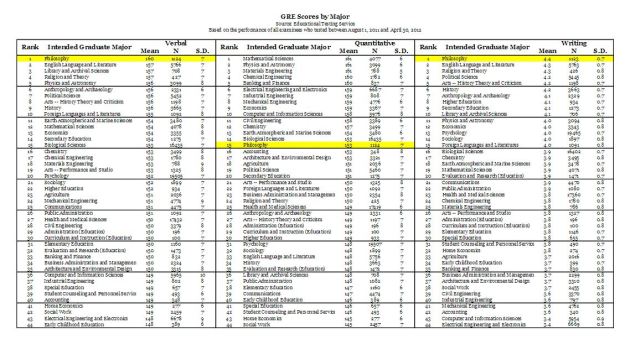Take a look at this table of GRE scores by major:
Notice anything in particular? Any majors that tend to do especially well in particular subject areas? Any lines highlighted in bright yellow?
You’re planning on taking the GRE, so hopefully you figured out that philosophy majors have the highest average score on both the verbal and the writing sections.
But it gets even better for philosophy students. If you look at the most recent score breakdown released by ETS, you’ll notice that over 5% of philosophy majors got a perfect score on the verbal sections. The next closest? Religion and theology, with a mere 2.5% getting a perfect score.
And for the writing section? 12.4% of philosophy majors got a perfect score, with religion and theology majors coming in a very distant second at 8.3%, and English majors struggling along at a mere 7.6%.
What does all this mean?
One, that students who are good at verbal reasoning and writing are probably more likely to go into philosophy in the first place.
But also, four years of constant practice at reading, writing, and dissecting logical arguments makes you pretty darn good at exactly the skills that the GRE is testing.
Fortunately, you don’t need to go back to school for four more years and major in philosophy in order to reap the benefits. All you need to do is read some philosophy in your spare time, when you would otherwise be Snapchatting/Instagraming/playing Pokemon Go. After all, if you’ve checked out my step by step guide to studying for the GRE, you’ll know that you should already be reading good non-fiction in your spare time and writing practice essays every now and then.


